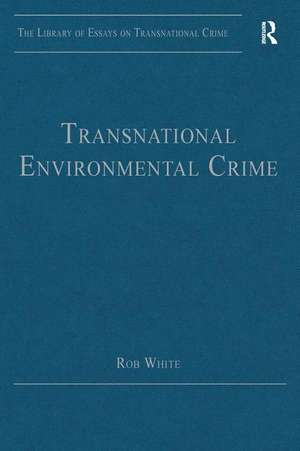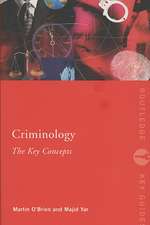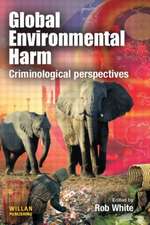Transnational Environmental Crime: The Library of Essays on Transnational Crime
Editat de Rob Whiteen Limba Engleză Hardback – 2 oct 2013
| Toate formatele și edițiile | Preț | Express |
|---|---|---|
| Paperback (1) | 409.73 lei 6-8 săpt. | |
| Taylor & Francis – 10 mai 2011 | 409.73 lei 6-8 săpt. | |
| Hardback (2) | 1109.04 lei 6-8 săpt. | |
| Taylor & Francis – 10 mai 2011 | 1109.04 lei 6-8 săpt. | |
| Taylor & Francis – 2 oct 2013 | 1642.68 lei 6-8 săpt. |
Preț: 1642.68 lei
Preț vechi: 2280.05 lei
-28% Nou
Puncte Express: 2464
Preț estimativ în valută:
314.37€ • 326.99$ • 259.53£
314.37€ • 326.99$ • 259.53£
Carte tipărită la comandă
Livrare economică 14-28 aprilie
Preluare comenzi: 021 569.72.76
Specificații
ISBN-13: 9781409447856
ISBN-10: 1409447855
Pagini: 568
Dimensiuni: 169 x 244 x 41 mm
Greutate: 1.32 kg
Ediția:1
Editura: Taylor & Francis
Colecția Routledge
Seria The Library of Essays on Transnational Crime
Locul publicării:Oxford, United Kingdom
ISBN-10: 1409447855
Pagini: 568
Dimensiuni: 169 x 244 x 41 mm
Greutate: 1.32 kg
Ediția:1
Editura: Taylor & Francis
Colecția Routledge
Seria The Library of Essays on Transnational Crime
Locul publicării:Oxford, United Kingdom
Cuprins
Contents: Introduction; Part I Thinking about Transnational Environmental Crime: Transnational environmental crime: exploring (un)charted territory, Liselotte Bisschop; Conceptualising and combating transnational environmental crime, Glen Wright; The global transference of toxic harms, Diane Heckenberg; Causes for speciesism: difference, distance and denial, Ragnhild Sollund; Dire forecast: a theoretical model of the impact of climate change on crime, Robert Agnew; Where might we be headed? Some of the possible consequences of climate change for the criminological research agenda, Stephen Farrall. Part II Conflicts, Victimisation and the Environment: Cross-national environmental injustice and human rights issues: a review of evidence in the developing world, Francis O. Adeola; Environmental disputes and human rights violations: a role for criminologists, Richard D. Clark; When social movements bypass the poor: asbestos pollution, international litigation and Griqua cultural identity, Linda Waldman; Deforestation crimes and conflicts in the Amazon, Tim Boekhout van Solinge; Toward defining the concept of environmental crime on the basis of sustainability, Ali Mohamed Al-Damkhi, Ali Mohamed Khuraibet, Sabah Ahmed Abdul-Wahab and Faten Abdul-Hameed Al-Attar. Part III Pollution and Waste: Green criminology and dirty collar crime, Vincenzo Ruggiero and Nigel South; Is it all going to waste? Illegal transports of e-waste in a European trade hub, Liselot Bisschop; International waste trafficking: preliminary explorations, Ana KlenovÅ¡ek and Goradz MeÅ¡ko; Conservation criminology and the global trade in electronic waste: applying a multi-disciplinary research framework, Carole Gibbs, Edmund F. McGarrell, Mark Axelrod and Louie Rivers III; Toxic atmospheres: air pollution, trade and the politics of regulation, Reece Walters. Part IV Biodiversity and Wildlife Crime: The ’corporate colonisation of nature’: bio-prospecting, bio-piracy and the development of green criminolo
Notă biografică
Rob White is Professor of Criminology in the School of Sociology and Social Work, University of Tasmania, Australia.
Descriere
The essays selected for this volume illustrate the growing interest in and importance of crime that is both environmental and transnational in nature. The collection provides insight into the nature and dynamics of this type of crime and also considers differential victimisation and contemporary developments in environmental law enforcement. Collectively, these essays lay the foundations for a criminology that is forward looking, global in its purview, and that deals with the key environmental issues of the present age.
Recenzii
'This book makes an extraordinarily compelling case for expanding the focus of criminology, considering a host of harms against the environment, non-human species, and humans – harms that transcend national borders and threaten the future of life on our planet. The eco-global approach described in the book provides a framework for conceptualizing these harms and conducting research on them. It is an important addition to the rapidly growing field of green criminology, written by one of the leading scholars in the field, and I enthusiastically recommend it to students, criminologists, and others.' – Robert Agnew, Samuel Candler Dobbs Professor of Sociology, Emory University
'Human beings draw lines around property, cities, states and nations, lines which we kill and die to protect. But air, water, windblown dust and seeds and migrating animals, pay no heed to human borders.
Within the biosphere, living organisms and their physical surroundings are intermeshed while succeeding generations of people benefit or suffer from the actions of those before them. We need a new class of crimes that take account of the "real" world, and thus transcend our boundaries and span generations. This book is a start at expanding our notions of responsibility and culpability.' – David Suzuki, Co-Founder of the David Suzuki Foundation
'Over the past decades research and literature addressing the topic of so called green criminology have shown a steady, though fragmented increase. With this brilliant book Rob White brings the field a huge step forward by expanding the notion of harm, and by presenting and systematizing the topics encompassed by the field, e.g. the consequences of human consumption, such as climate change, e-waste and deforestation. By providing methodological and theoretical tools as well as a vocabulary we can use to address and understand the field with, this book will be highly cherished both by students of eco-global criminology as well as by experienced scholars. Rob White shows not only why the situation of our planet and all its inhabitants is of deep concern, but also the role criminology can and should play to achieve a better world for all. Rob White has again confirmed that he is in the forefront of the field.' – Professor Ragnhild Sollund, University of Oslo, Department of Criminology and Sociology of Law
'Human beings draw lines around property, cities, states and nations, lines which we kill and die to protect. But air, water, windblown dust and seeds and migrating animals, pay no heed to human borders.
Within the biosphere, living organisms and their physical surroundings are intermeshed while succeeding generations of people benefit or suffer from the actions of those before them. We need a new class of crimes that take account of the "real" world, and thus transcend our boundaries and span generations. This book is a start at expanding our notions of responsibility and culpability.' – David Suzuki, Co-Founder of the David Suzuki Foundation
'Over the past decades research and literature addressing the topic of so called green criminology have shown a steady, though fragmented increase. With this brilliant book Rob White brings the field a huge step forward by expanding the notion of harm, and by presenting and systematizing the topics encompassed by the field, e.g. the consequences of human consumption, such as climate change, e-waste and deforestation. By providing methodological and theoretical tools as well as a vocabulary we can use to address and understand the field with, this book will be highly cherished both by students of eco-global criminology as well as by experienced scholars. Rob White shows not only why the situation of our planet and all its inhabitants is of deep concern, but also the role criminology can and should play to achieve a better world for all. Rob White has again confirmed that he is in the forefront of the field.' – Professor Ragnhild Sollund, University of Oslo, Department of Criminology and Sociology of Law





















